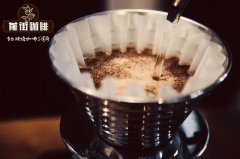Indonesian Java coffee beans have origins with Arabica.

Professional coffee knowledge exchange more coffee bean information please follow the coffee workshop (Wechat official account cafe_style)
Qianjie-Sumatran Coffee and Java Coffee
Sumatran caffeine is famous for its unique aroma of herbs and trees. This is partly due to the mix of planting varieties and the local climate. On the other hand, it is due to a special processing method, called wet shell method, locally known as Giling Basah, which gives these coffees many unique qualities.
Before the 1970s, coffee in Sumatra was processed in two of the most common methods in the world: washing and tanning. In the 1970s, Japanese interest in Sumatran coffee led to the introduction of wet shell technology. This is a unique treatment and drying method, which is to a large extent the reason for the unique flavor characteristics of Sumatran coffee and the bluish blue color of its coffee.
Java may have the most complex history of so many coffee varieties, if not rosy summer.
Although it is called Java, it is by no means an Indonesian bean. Java originated in Ethiopia. As early as the 19th century, the Dutch introduced this bean from Ethiopia to Java, Indonesia, hence the name Java. In the middle of the 20th century, the French company Vilmorin collected seeds from Prutes (Prut), a famous grower in Java, Indonesia, and sent them to Cameroon in Africa.
Another breeder in Cameroon, Pierre Bouharmont (Pierre Buhamont), found that Java is partially resistant to coffee berry disease, a coffee disease that afflicts Africa, and yields are good without much fertilizer. After 20 years of optimal selection, Cameroon released the bean seed for farmers in 1980-90.
After genetic fingerprinting of the molecular markers, the research institute has been able to conclude that Java is an endemic species from the Ethiopian native variety Abysinia. If planted at high altitude, Java will have excellent quality and can even compete with Rose Summer!
In 1991, breeder Benoit Bertrand (Benoit Bertrand) sent Java bean seeds to Costa Rica through the International Center for Agronomic Research (CIRAD) to provide to small coffee farmers. The aim is to give small coffee farmers access to new varieties that are less fertilized and resistant to berry disease, even though there was no serious berry disease in Central America at the time.
Based on this consideration, the seeds were sent to all countries where coffee cultivation technology development and modernization regional cooperation projects (PROMECAFE) mutual aid alliance, but never really promote cultivation in those countries, no country has ever released this variety to the outside world. Subsequently, Java's quality potential at high altitudes was recognized. In 2016, Panama in Central America became the first coffee country to recognize Java.
Panama believes that the Java variety is an attractive substitute for Rosa, which has high flavor quality, good tolerance to leaf rust and coffee berry disease, and is very suitable for small farmers with low input.
Knowledge: in the 1860s and 1970s, outbreaks of coffee leaf rust destroyed the Indonesian coffee market and caused the Dutch to abandon many estates. With the collapse of the plantation, workers occupied small plots of land and eventually replanted coffee with Robosta coffee and various disease-resistant Arabica hybrids.
In short: Qianjie is a coffee research hall, happy to share the knowledge about coffee with you, we share unreservedly just to make more friends fall in love with coffee, and there will be three low-discount coffee activities every month. The reason is that Qianjie wants to make more friends drink the best coffee at the lowest price, which has been Qianjie's tenet for 6 years!
END
Important Notice :
前街咖啡 FrontStreet Coffee has moved to new addredd:
FrontStreet Coffee Address: 315,Donghua East Road,GuangZhou
Tel:020 38364473
- Prev

What are the characteristics of Blue Mountain Coffee? how much is a real Jamaican Blue Mountain Coffee?
Professional coffee knowledge exchange more coffee bean information please follow the coffee workshop (Wechat official account cafe_style) front street-Blue Mountain Coffee introduction first let's popularize what is Blue Mountain Coffee, Blue Mountain is located in the eastern part of Jamaica, the highest peak is 2256 meters above sea level, is the highest peak in the Caribbean region, is also a famous tourist attraction. It's located in the coffee belt, with
- Next

How about Indonesian coffee? Indonesian Java coffee honey treats different flavors.
Professional coffee knowledge exchange more coffee bean information please follow the coffee workshop (Wechat official account cafe_style) front street-Indonesia West Java Coffee introduction West Java Province, is the first-level administrative district of Indonesia. Located in the western part of Java, facing the Java Sea to the north and the Indian Ocean to the south, including offshore islands, covering an area of 46300 square kilometers, Java has a tropical rain forest climate all the year round.
Related
- Beginners will see the "Coffee pull flower" guide!
- What is the difference between ice blog purified milk and ordinary milk coffee?
- Why is the Philippines the largest producer of crops in Liberia?
- For coffee extraction, should the fine powder be retained?
- How does extracted espresso fill pressed powder? How much strength does it take to press the powder?
- How to make jasmine cold extract coffee? Is the jasmine + latte good?
- Will this little toy really make the coffee taste better? How does Lily Drip affect coffee extraction?
- Will the action of slapping the filter cup also affect coffee extraction?
- What's the difference between powder-to-water ratio and powder-to-liquid ratio?
- What is the Ethiopian local species? What does it have to do with Heirloom native species?

